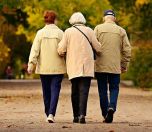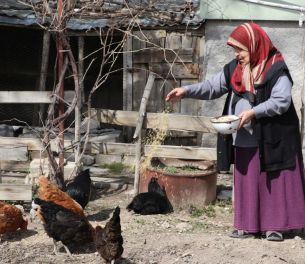* Photo: Anadolu Agency (AA) - Archive
Most notably in the recent years amid the novel coronavirus (COVID-19) pandemic, an increase in international cases of violence against older people could be registered, as the United Nations (UN) experts also warned ahead of June 15 World Elder Abuse Awareness Day.
A few weeks later, the Senex Association for Aging Studies, specifically focussing on Turkey, has published its monthly report "Monitoring Violence and Violation of Rights Against Older People".
As indicated by the Association in its June report, Antalya Aging Study waves in 2013, 2016, and 2020 showed that ageism rose from 3.5 percent to 7 percent and finally to 10 percent respectively. As a matter of fact, ageism has reached 8 percent in Turkey during the COVID-19 pandemic, as can be seen in the research conducted with Raoul Wallenberg Institute's support.
As a vulnerable part of society, especially cases of violence in form of neglect, discrimination and violation of rights often remain unrecognized. Now, as violence against elderly people became increasingly prevalent, concise observation was necessary.
'A cyclical pattern of violence'
According to the observations of the Senex Association within this context, a cyclical pattern of violence can be observed.
In order to raise awareness about a frequently overlooked issue, the association started monitoring cases of violence reported in the printed media news against people between the ages of 45 and 95 and calls upon the local governments and civil society to build on this factual support.
In June, the Senex Association reported 133 cases of violence, neglect, violation of rights and discrimination. Most of them took place in İstanbul (15), followed by Aydın (12) and Antalya (10) provinces.
Very strikingly, 53 percent of the cases in Turkey resulted in deaths. Among those, 38 cases consisting of fatalities caused by unnatural events and 25 cases were classified as suspicious deaths. The remaining cases consisted of murder (4) and suicide (4).
While older women were affected in 37 percent of the cases, 55 percent were directed against older men. In the remaining number of cases, the gender is unknown or they affected older couples.
Poor older adults are the most affected group
The average age of people affected is 72.
Concerning the affected groups, several intersections could be pointed out. Since the start of the monitoring, the most common cases of death due to violence and neglect occurred at the intersection of poor older people, with especially widowed and disabled older women subjected to violence.
With the official outbreak of the coronavirus outbreak in Turkey in March 2020, Turkey was the first country to impose restrictions based on age.
Adding to the cases of death due to neglect, the restrictions due to the coronavirus outbreak further increased loneliness of the elderly as a further risk factor for increased suicides.
NOTE: In this respect, a possible indicator could be the allocation of the cases counting zero in the east of Turkey. According to the findings of the institute of population studies, in the East of Turkey, households in many villages consist of extended families, including the elders.
Hate spread in the media
Very often, the increased gender-based violence, abuse and neglect of older people receives little attention.
As elderly were the ones especially exposed to the risks of infection, they additionally became the object of hatred stemming from the people frustrated by the government's pandemic restrictions worldwide.
Discriminatory narratives in the media ignore the context of structural discrimination and aggravate the negative, exclusive attitude against older people. News without any further research basis claim that 25 percent of older people are against vaccination, whereas the number of unvaccinated older people often stems from the obstacles for this socially disadvantaged group to get access to the vaccine or an appointment in first place.
Easy possibility of prevention
According to the monthly report of the Senex Association for Aging Studies, 9 cases of fire were registered in June. The most freuquently encountered fires happen in houses where older people are living alone. As further, the third most common type of violence consisted of accidents due to neglect, which indicates the possibility of an easy prevention.
Taking a closer look at the pattern, it shows that older people and especially the most vulnerable intersections are severely disadvantaged by structural factors in Turkey. The Senex gives recommendations of preventive measures, which could avoid tragic deaths by accidents.
Hence, the Senex Association recommends to decrease harmful effects by taking preventive measures such as developing the services and the provision of an age-friendly environment. Easy preventions of this kind can help to decrease harmful effects and reduce deaths. (BB/SD)








-132.jpg)

